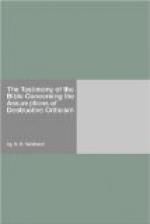3. He rebuked the scribes and Pharisees also for turning from the word of God to the traditions of men. “For Moses said, Honor thy father and thy mother.” (Mark vii. 10.) This quotation is from Exod. xx. 12, and Deut. v. 16. They had made the command of Moses of no effect, had violated the law which Christ taught had been given by Moses.
4. The Sadducees came to him with their controversy concerning the resurrection. They presented to him an unanswerable argument, as they supposed, against the doctrine, questioning as to whose wife she should be in the resurrection, who has had seven husbands in this life. Christ replied (Mark xii. 26, 27): “As touching the dead, that they rise; have ye not read in the book of Moses how in the bush God spake unto him, saying, I am the God of Abraham, and the God of Isaac, and the God of Jacob? He is not the God of the dead, but the God of the living.”
This quotation by our Lord is from Exod. iii. 6, and he calls the book from which it is made “the book of Moses.” Did Christ know whether it was the book of Moses or of some unknown author who had so artfully palmed it off under false colors as to deceive the entire Jewish nation?
Or, as certain of the critics teach, did Christ know that the pretense that it was the book of Moses was a fraud, but, in view of public opinion, was unwilling to expose the deception? To ask these questions is to uncover the animus of the critical assumptions which logically attack the character of Christ himself.
Christ knew who was the author of the book, and knowing, he affirmed that it was “The Book of Moses.”
5. In our Lord’s parable of the rich man and Lazarus, Dives is represented as pleading that some one be sent from the dead to warn his brothers, lest they also come into this place of torment. The reply to his request was: “They have Moses and the prophets.... If they hear not Moses and the prophets, neither will they be persuaded, though one rose from the dead.” (Luke xvi. 29, 30.) “Moses and the prophets” was the name for the Jewish Bible. If Moses did not write the Pentateuch, the name of their Bible was false, and the Savior indorsed a falsehood. We believe “the faithful and true Witness,” and reject the critics who dishonor his character.
6. After Christ’s resurrection he walked and communed with the two disciples on the way to Emmaus. He instructed them concerning the Messiah’s death, and, “beginning at Moses” (Luke xxiv. 27), informed them that it was God’s plan, foretold in the Old Testament. He appeared to his apostles and declared to them that “all things must be fulfilled which are written in the law of Moses and the prophets.” (Luke xxiv. 44.) The critics deny Moses’ authorship, but Christ affirms it, using the language that means the Pentateuch. We believe him.
7. In our Lord’s conversation with Nicodemus he recognizes Moses in connection with the book of Numbers. He refers to the historical incident, if our critical friends will leave us any Biblical history, in Numbers xxi. 8, 9. He says: “As Moses lifted up the serpent in the wilderness, even so must the Son of man be lifted up,” (John iii. 14.)




